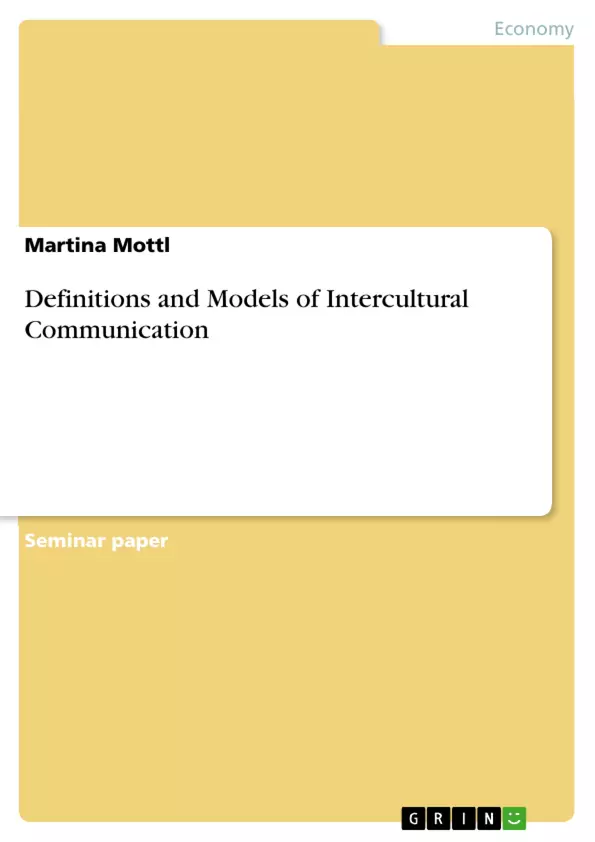The need for understanding diversity in cultures is not only essential when negotiating with business partners of other cultures or when going on holidays. Moreover, everybody – be it immigrants like Anika Rahman, expatriates or even people living in their country of birth – has to deal with different cultures everyday. We meet people from diverse cultural backgrounds at school, when we are shopping, at work, when we go out at night, and so forth. The study of intercultural communication gives us the tools to manage the cultural differences and to become more sensitive in intercultural encounters.
Inhaltsverzeichnis (Table of Contents)
- INTRODUCTION
- CULTURE
- INTERCULTURAL COMMUNICATION
- THE IDENTITY NEGOTIATION PERSPECTIVE
- IDENTITY NEGOTIATION OF MUSLIMS AND ARAB-AMERICANS AFTER SEPTEMBER 11TH
- The Impacts of threat to one's identity:
- The Outcome of Identity Negotiation
- Approaching
- Avoiding
- Leaving the scene
- THE SOCIAL IDENTITY THEORY
- NEGOTIATING SOCIAL IDENTITY AND RESPONDING TO THREAT
- The Goals of the Research
- The Project
- The Probationers
- The Meetings
- The Measures
- The Results
- Identity Change
- The Correlation between Identity Salience and Ethnic Activities
- The Correlation between Perceptions of Threat and Ethnic Involvement
- THE ROLE OF IDENTITY NEGOTIATION IN SMALL GROUPS
- IDENTITY NEGOTIATION
- Self-Categorization and Depersonalization
- Self-Verification
- Homogenization and Individuation
- Appraisal Effects
- FROM DIVERSITY TO PERFORMANCE
- The Initial Impressions
- The Correlation between Homogenization and Appraisal Effects
- The Correlation between Individuation and Self-Verification
- The Relation of Identity Negotiation to Performance
- DISCUSSION
Zielsetzung und Themenschwerpunkte (Objectives and Key Themes)
This study aims to explore the concept of identity negotiation in the context of intercultural communication, particularly in the wake of the September 11th attacks. It investigates how individuals navigate their identity in the face of threats, drawing upon the Identity Negotiation Perspective and Social Identity Theory. The study further examines the role of identity negotiation within diverse work groups, highlighting its impact on group performance and dynamics.
- The impact of threats on identity and how individuals respond to these threats.
- The dynamics of identity negotiation within diverse groups.
- The influence of cultural differences on communication and understanding.
- The role of cultural artifacts, language, and nonverbal cues in shaping identity negotiation.
- The implications of identity negotiation for group performance and dynamics.
Zusammenfassung der Kapitel (Chapter Summaries)
The first chapter introduces the concepts of culture and intercultural communication, emphasizing the importance of understanding cultural differences in navigating diverse interactions. Chapter two focuses on the Identity Negotiation Perspective, analyzing how individuals negotiate their identity in the aftermath of September 11th, particularly focusing on the experiences of Muslims and Arab-Americans. The chapter explores various strategies for managing identity in the face of threats, such as approaching, avoiding, or leaving the scene.
Chapter three delves into the Social Identity Theory and its application to understanding how individuals respond to threats to their social identity. The chapter examines a research project investigating the relationship between identity salience, ethnic involvement, and perceptions of threat. Finally, Chapter four explores the role of identity negotiation within small groups, focusing on the concepts of self-categorization, self-verification, homogenization, and individuation.
Schlüsselwörter (Keywords)
This text explores the key concepts of intercultural communication, identity negotiation, social identity theory, diversity, and cultural differences. It focuses on understanding the impact of threats on identity, the dynamics of identity negotiation within groups, and the implications for group performance and dynamics. The text also draws upon key theories and research findings to provide a comprehensive analysis of the subject.
- Citation du texte
- Martina Mottl (Auteur), 2002, Definitions and Models of Intercultural Communication, Munich, GRIN Verlag, https://www.grin.com/document/10159



